Stripping for Freedom
Aaron Tobey stripped to his underdrawers in a Richmond, Virginia airport in support of the 4th Amendment.
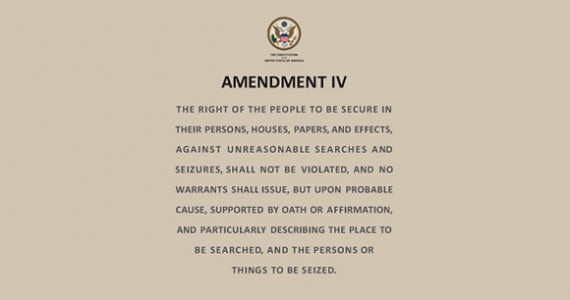 Aaron Tobey loves him some freedom:
Aaron Tobey loves him some freedom:
A Charlottesville man who stripped down to his underwear at Richmond International Airport to protest security-screening procedures was charged with disorderly conduct Thursday, airport police said.
Airport police identified him as Aaron B. Tobey, 21. He told police he was a student at the University of Cincinnati. The incident occurred at 2:17 p.m. at Checkpoint B, the busier of the airport’s two checkpoints, said airport spokesman Troy M. Bell. Bell said police reported that when they arrived at the checkpoint, they found Tobey, “absent of pants and shirt in full public view, exposing language regarding the Fourth Amendment written on his chest and abdomen with marker or crayon.”
I’m going with “marker” rather than “crayon” here, in that the latter doesn’t tend to work well on skin.
The message read, “Amendment 4: The right of the people to be secure against unreasonable searches and seizures shall not be violated,” Bell said.
That’s Amendment 4, all right. And I happen to think that the current security regime, which forces people to undergo searches upon passing a certain point in airports, to be unreasonable. Alas, the courts don’t agree with me and, as several posts at OTB today note, that’s what ultimately matters.
But Tobey has every right to disagree with that interpretation of the Constitution and take reasonable measures to generate publicity for his cause. Is stripping to one’s skivvies in public reasonable? The authorities apparently didn’t think so:
Tobey was interviewed by airport police and federal authorities, issued a citation for disorderly conduct and released. He is scheduled for arraignment in Henrico County General District Court on Jan. 10.
A judge will ultimately decide (I doubt this is subject to jury trial) but I strongly suspect not in Tobey’s favor. Indeed, though I support his cause, I’d have to say he crossed the line here.


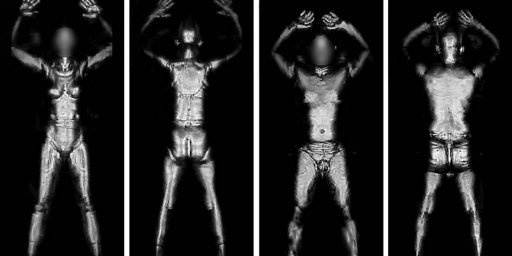
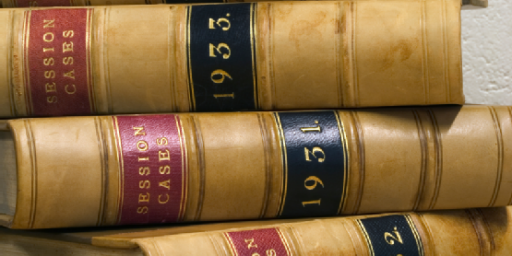
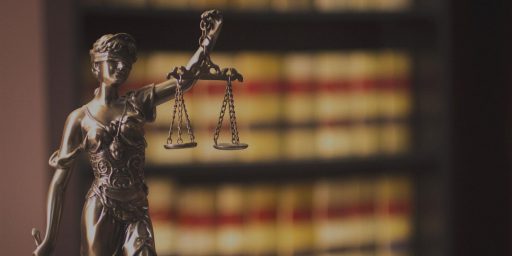
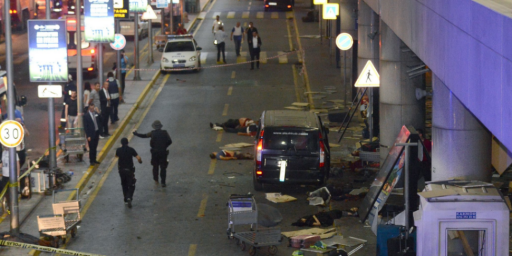
He has the freedom to not fly.
If only he’d been a hot woman. Then the legal issues would be clear.
Terrye: That’s the road to tyranny. And it’s a pretty short road.
Are the “road to tyranny” issues with intrusive TSA procedures any worse than those regarding DUI checkpoints, especially “forced” DUI checkpoints like this:
http://www.kansascw.com/kscw/news/kwch-news-no-refusal,0,4448548.story
@ratufa:
I think the Court rulings upholding these random, no-cause searches clearly violates the 4th Amendment. Still, one imagines this localities “no refusal” policy will be struck down.
But there is a difference between driving and riding on public transit. In the former case, there’s a compelling government interest in protecting others from negative externalities that trumps the absolute right of people to get into powerful machinery and drive it at high speeds amongst others. The same holds true, obviously, of those who would fly airplanes and sell tickets to the public. But there’s no significant danger in letting people ride said airplanes that demands searching them.
Yes, obviously, there’s the risk that one of them is a terrorist. But there are far, far higher risks that a random male aged 17 to 24 is a public danger than for a random commercial airline passenger. We don’t countenance random searches based on the notion that, hey, it’s possible this person is a criminal.
@Michael: Yes, the hot woman exception occurred to me as well.
there’s a compelling government interest in protecting others from negative externalities that trumps the absolute right of people to get into powerful machinery and drive it at high speeds amongst others.
I don’t see any greater compelling interest here than in flight. You can say there’s a driver/passenger distinction, but that’s a meaningless distinction so long as our transportation network is dependent on people being able to drive themselves. If restricting the ability to drive did not restrict mobility to the extent that it did (say that there was better public transportation), I would find that logic more compelling. As it is, I think saying “you don’t *have* to drive” is actually considerably more restricting than “you don’t *have* to fly” because, at least within the continental US, there is a pretty clear alternative available.
@Will
There’s no doubt that driving has become nearly essential to living as a free and independent citizen in most of the country. But we’ve accepted from the beginning that (local and state) government should set and enforce basic rules of the road, including ensuring that drivers are minimally competent to operate a motor vehicle.
As noted above, I think having to prove that you’re not intoxicated when you’ve given no reasonable suspicion, much less probable cause, that you are is outrageous. But I don’t think having government take reasonable measures to keep drunks off the road is controversial.
“Terrye: That’s the road to tyranny. And it’s a pretty short road.”
I can’t tell if you were joking with this comment or not. If not it’s bizarrely hyperbolic given your usual even headed analysis. Not being able to fly because you choose not to go through security is in no way a road to tyranny any more than not being able to drive without a license is.
Now I happen to think a lot of the security added has been a stupid overreaction to 9/11 that does nothing to actually increase security and is wasted efforts compared to all the ways you are much more likely to die than terrorism. That said I have no right to fly. It’s a service, one that I have no divine claim to. Flying is not necessary for citizens to live or even travel. Losing access to flight at best poses a career impediment to a select few.
“That’s the road to tyranny. And it’s a pretty short road.”
As noted above, slightly hyperbolic in relation to flying. Tell me something tho James, if it were the airlines requiring these searches, would it be more acceptable to you? (a serious question)
Regardless, Aaron Tobey is my new hero. His actions speak louder than words.
@Tlaloc and @tom p: The tyranny I’m referring to isn’t the TSA regs but the attitude that the proper response to objections to government intrusions is to avoid the activity government is intruding into.
You can still protest and get your point across by wearing a T-shirt. Take off a light jacket to reveal the T-shirt with the Fourth Amendment written on it. That would be a good protest and should keep you out of trouble with the TSA and police.
>”The tyranny I’m referring to isn’t the TSA regs but the attitude that the proper response to objections to government intrusions is to avoid the activity government is intruding into”
James, nice try but you don’t get off that easy. I repeat: “if it were the airlines requiring these searches, would it be more acceptable to you?”
James, you know the “cul de sac” I have you blocked into… please give a straight answer:
IFFFFFFF…. an airline…
in an effort to protect their property (their $200 Million airplane) and CONTROL their liability (Billions$$$$$$$???????) put in place the exact same security procedures, would you have a problem with it???
If not, why?
Here is the problem I have with most Libertarians: They think gov’t is the problem when gov’t only does the bidding of corporations
@tom p:
That’s no “cul de sac.” It’s an entirely different matter.
If Delta airlines decides to require absurd measures in order to use their services, I can choose another carrier. If enough people do that, Delta will back off. If the airlines conspire to enact the policy in unison, people can choose not to fly and/or seek to use government’s power to combat the collusion. In either event, it’s an action taken by private companies.
Because of its enormous power, we’ve always viewed government differently. The Bill of Rights protects us against governmental intrusions, not against those of our fellow citizens.
But, again, I’m not arguing that governmental overreaching in this case amounts to tyranny (although I think some of the individual incidents as applied by TSA agents come pretty close) but to Terrye’s comment. It’s akin to the old “if you have nothing to hide . . . ” chestnut.